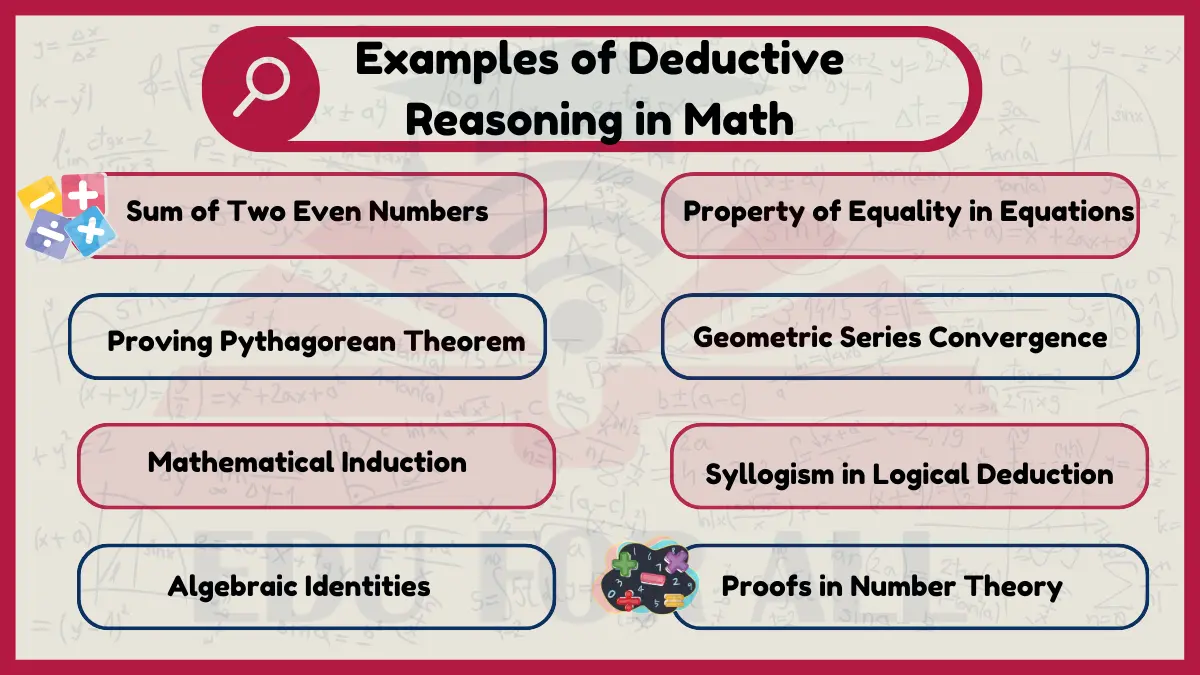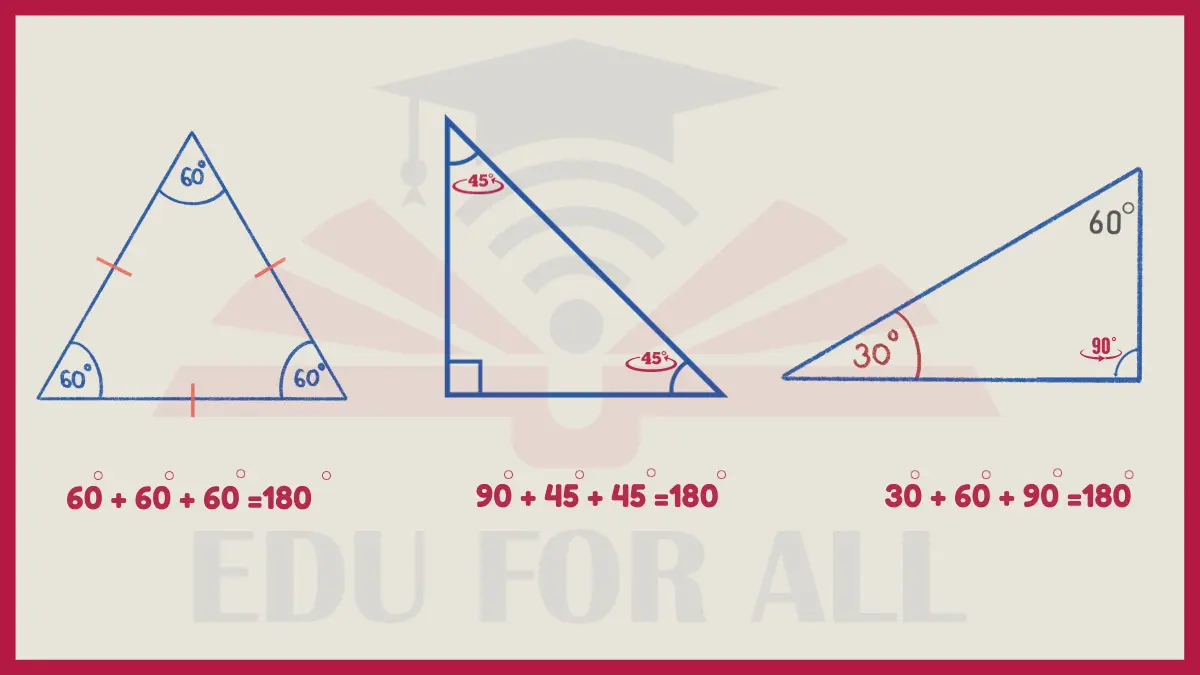Deductive reasoning in math finds practical applications in various real-world scenarios. Architects and engineers use Euclidean geometry to calculate stress, angles, and load distributions when designing structures, ensuring their safety.
GPS navigation systems depend on deduced trigonometric mathematical identities for accurate triangulation of locations, enabling precise and reliable navigation.

Any field requiring the analysis of quantitative data or geometric precision relies fundamentally on the deductively proven theorems and principles of mathematics.
- Examples of Deductive Reasoning in Math
- 1: Sum of Two Even Numbers
- 2: Proving a Triangle’s Angles Equal 180 Degrees
- 3: Property of Equality in Equations
- 4: Proving Pythagorean Theorem
- 5: Geometric Series Convergence
- 6: Mathematical Induction
- 7: Distributive Property
- 8: Syllogism in Logical Deduction
- 9: Finding Roots of Quadratic Equations
- 10: Mathematical Proofs in Number Theory
- 11: Euclidean Geometry
- 12: Algebraic Identities
- 13: Proving Trigonometric Identities
- 14: Proofs in Number Theory
- 15: Proofs in Set Theory
- 16: Logical Inference Rules
- 17: Geometric Constructions
- 18: Proofs in Group Theory
- 19: Proofs in Graph Theory
- 20: Proofs in Calculus
Examples of Deductive Reasoning in Math
Here are the additional 10 examples of deductive reasoning in math:
1: Sum of Two Even Numbers
Sum of Two Even Numbers is one of the most common Examples of Deductive Reasoning in Math. Based on the axiom that an even number is divisible by 2, one can deductively prove that the sum of two even numbers is always even.
Experiment: Add various combinations of even numbers and check if the result is always even.
2: Proving a Triangle’s Angles Equal 180 Degrees
Based on Euclidean geometry axioms of parallel lines and angles formed by a transversal, one can logically prove that the sum of angles in any triangle equals 180 degrees.

Experiment: Measure angles in different triangles using protractor and see if they always add to 180 degrees.
Also Read Common Examples Angles
3: Property of Equality in Equations
The property that equals added to equals are equal is an axiom that allows logical, deductive manipulation and solution of equations.
Experiment: Perform allowed operations on simple equations like 2+3 = 5 to derive new logical forms like 2+3+4 = 5+4.
4: Proving Pythagorean Theorem
Based on Euclidean geometry assumptions of right triangles and squares, one can logically prove Pythagorean theorem on lengths of triangle sides algebraically or geometrically.
Experiment: Make different right triangles and measure the areas of squares on their sides to verify Pythagorean relationship.
5: Geometric Series Convergence
For a geometric series with common ratio r less than 1, one can deductively prove that the series converges based on axioms of geometric sequences and limits.
Experiment: Plug in different values for r between -1 to 1 in geometric series and see if the partial sums behave as proven theoretically.
6: Mathematical Induction
Mathematical induction is itself a deductive proof technique based on axioms and properties of the natural numbers used to prove statements for all natural number values.
Experiment: Test small cases of conjectures over natural numbers to discover patterns that can then be formally proven true for all numbers mathematically using induction.
7: Distributive Property
The distributive property of multiplication over addition can be logically proven true based on set theory axioms and basic arithmetic definitions.
Experiment: Multiply sample numbers of form a(b+c) vs. ab + ac to verify equality and distributive property.
8: Syllogism in Logical Deduction
A syllogism applies deductive reasoning with two premises to arrive at a logical conclusion. For example, All men are mortal. Socrates is a man. So, Socrates is mortal.
Experiment: Practice forming syllogisms starting from factual or assumed premises to derive new logical inferences.
9: Finding Roots of Quadratic Equations
The quadratic formula for roots can be derived deductively based on logical reasoning manipulating a standard quadratic equation using allowed rules of algebra.
Experiment: Solve sample quadratic equations by substituting values in the general quadratic formula.
10: Mathematical Proofs in Number Theory
Many fundamental results in number theory like the infinity of primes are proven true for all numbers using deductive arguments based on factors and divisibility rules.
Experiment: Test patterns in primes and factorization for first few natural numbers to discover basis for proofs.
11: Euclidean Geometry
Euclidean geometry is one of the important Examples of Deductive Reasoning in Math. It starts with basic axioms and uses deductive logic to derive geometric properties and theorems. For example, one can start with axioms about parallels and angles and logically deduce properties of triangles and circles.
Experiment: Using a ruler and protractor, measure the angles and sides of different triangles and test if they follow theorems like the sum of angles equals 180 degrees.
12: Algebraic Identities
Algebraic identities are equations that are true for all values of the variables by the basic axioms of algebra. For example, the distribution property: A(B+C) = AB + AC. These identities can be used deductively in algebraic proofs and manipulations.
Experiment: Plug in random number values for variables in identities to verify they equate true.
13: Proving Trigonometric Identities
Trigonometric identities can be proven using deductive logic, starting from basic trig definitions and axioms. For example, sin(x)+cos(x) = 1 can be logically derived. These identities support deductive proofs of other trig properties.
Experiment: Use a unit circle to measure trig function values at various angles to discover and verify trig identities.
14: Proofs in Number Theory
Number theory includes mathematical proofs and theorems derived deductively from basic axioms of the integer number system. For example, infinity of primes, properties of prime factorization, Diophantine equations, etc.
Experiment: Test conjectures and patterns with the first few prime numbers or integer cases to discover and prove basic number theory.
15: Proofs in Set Theory
Set theory defines axioms about sets and set operations that can be used to prove theorems about sets deductively. For example, mathematical induction is based on set theory axioms.
Experiment: Take different sets of common items, like fruits, shapes, etc. and test if they follow set theory axioms and properties.
16: Logical Inference Rules
Logical inference rules like modus ponens, syllogism, etc. allow deductive reasoning from given facts and axioms to prove new conclusions. For example, in formal logic and computer programming.
Experiment: Practice applying logical inference rules to simple factual statements to derive new logical conclusions.
17: Geometric Constructions
Geometric constructions use deductive logic from accepted geometric axioms and tools like compass and straight-edge to construct shapes like angles, triangles, and circles.
Experiment: Use geometric tools to try constructing shapes following logical step-by-step procedures.
18: Proofs in Group Theory
Abstract algebra includes group theory axioms used to prove theorems about groups and subgroups deductively, like Lagrange’s theorem.
Experiment: Take finite mathematical “groups” like permutations, matrices and test if they follow group theory axioms and theorems.
19: Proofs in Graph Theory
Graph theory uses axioms and properties of graphs and networks to logically prove theorems like Euler path criteria deductively based on the graph topology and connectivity.
Experiment: Draw different graph topologies and check if they satisfy criteria for properties like completeness, traversibility mathematically proven from graph theory.
20: Proofs in Calculus
Calculus employs deductive logic, starting from foundational axioms about real numbers, functions and limits to logically prove major theorems like Rolle’s theorem and the mean value theorem.
Experiment: Empirically check properties of curves and slope values at points to discover patterns leading to calculus theorems.
Also Read

